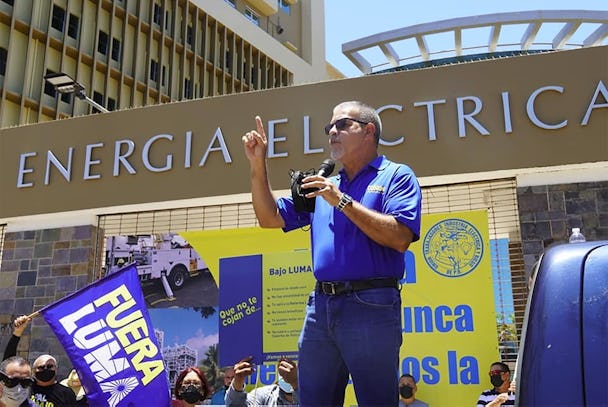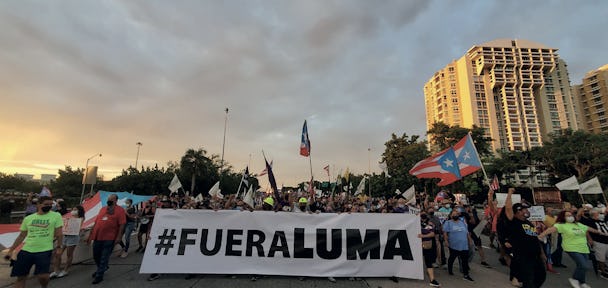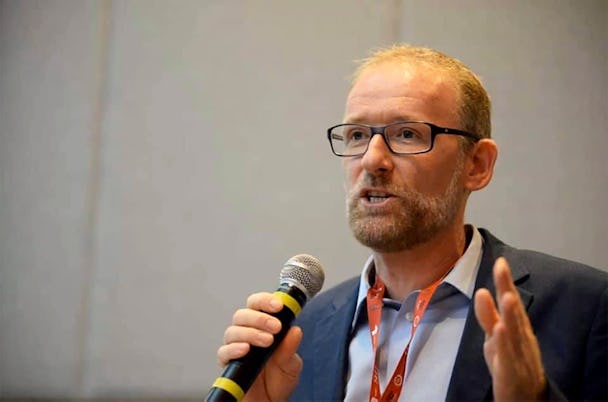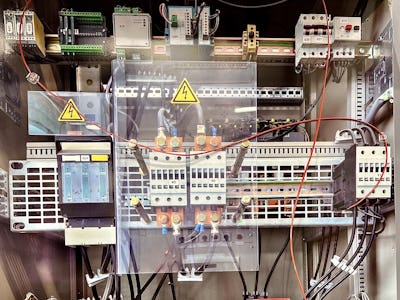An Attack on Puerto Rico’s Electricians’ Union
The hurricane Maria destroyed large parts of the already poor country Puerto Rico in 2017. A couple of years later, multiple earthquakes made things even worse. Then the pandemic came, and crippled most of the country.
In this situation, efforts are made to crush the electricians’ union.

– The catastrophes are used to privatize the country’s power grid. July 1, the privately owned Luma Energy took over the management of the country’s power grid. Unfortunately, this has happened before – that when people are busy with other things after catastrophes, authorities and private companies see their chance, says Ángel R Figueroa Jaramillo, president of many years of UTIER.
Klicka här för att läsa den svenska versionen av artikeln.
Ángel R Figueroa Jaramillo, president of many years of the Union of Electrical and Irrigation Industry Workers (UTIER), is upset when Elektrikern reaches him.
– The catastrophes are being used in order to privatize the country’s power grid. July 1, the privately owned Luma Energy took over the management of the country’s power grid. Unfortunately, this has happened before – that when people are busy with other things after catastrophes, authorities and private companies see their chance, he says.
All the benefits and right we had acquired through 79 years of struggle disappeared. Our collective agreement became null and void.
Jarmillo is himself an electrician since 33 years back, a known profile and a strong voice within the labour movement in Puerto Rico. Agitatedly, he continues:
– About 800 electricians used to work there when the power grid was publicly owned, and everyone was a member of UTIER. Those 800 people went on strike, together with thousands of others in an action of solidarity – and we are still organizing protests. But the governor, despite the workers’ protests, still made sure that Luma was given the contract.
The privatization invalidated the collective agreement
The official explanation is that the country’s power grid, which is often subject to outages, is supposed to become more stable, and the prices lower, with a profit-driven company – and not the state – as its owner.
Jarmillo, however, snorts at this argument.
He explains that the effect of the privatization on UTIER, which is the oldest and largest independent union in Puerto Rico, was that a great number of members lost their jobs, simultaneously as some left the union – as it was the only way to get employment in the private company.

This, he underlines, has resulted in there today being such a major lack of trained and practiced electrical workers that the country’s power supply is suddenly in danger.
– The privatization completely crippled the labour movement’s work. All the benefits and rights we had acquired through 79 years of struggle disappeared. Our collective agreement became null and void. The two biggest losses were the degradation of employment security, and that the pension system has been entirely hollowed out, says Jarmillo.
Pitching the unions against one another
He holds that different union organizations in the country are being pitched against one another – a fact he views as a great loss for the labour movement as a whole. And, he claims, a classic move in Latin America.
– In the span of a few years, our people have gotten themselves through hurricanes, earthquakes, and a pandemic. And as if all this wasn’t enough, the country’s economy is entirely bankrupt, with enormous debts and, on top of that, a wave of able workers moving to the US. But we cannot let our elderly die from poverty and our young grow up in poverty, he says.
Still, he has hope. The surrounding world has taken an interest, and he explains that through the years, different efforts to privatize publicly owned assets in Puerto Rico have met with resistance, and in the end been pushed back, for decades.

Campaign for electricians’ rights
The Puerto Rican electricians’ union UTIER and Public Service International, an international union organization for public service employees, are running a joint campaign. The purpose is to make Puerto Rico’s governor Pedro Pierluisi recognize the rights of the island’s electricians – and to restore their jobs.
A key in the efforts to make the world – and not least its labour movements – join the cause and support UTIER in Puerto Rico, is the Canadian Euan Gibb. He has the title Regional Assistant and Global Multinationals Organizer within Public Service International.
Every success of the Swedish unions in Sweden are analyzed by union sisters and brother in other countries.
Based in the Inter-America office in São Paulo, Brazil, he works with these types of subjects and solidarity campaigns.
– International solidarity helps in stopping the most aggressive attacks. Campaigns like this one, for the Puerto Rican electricians, can really make a difference – even though the circumstances there are difficult for everyone involved, he says.

Swedish union victories contribute
Around the world, thousands of people have supported the campaign in different ways – amongst others by clicking their support on the site www.LabourStart.org.
Euan Gibb, who has been doing union work his entire adult life and has double Master’s degrees in global labour subjects in Canada and Germany, establishes:
– There is one thing that’s important to point out. Every success of the Swedish unions in Sweden are analyzed by union sisters and brother in other countries. Thus it is important that things happening in Sweden are recognized and shared as well.
Text: Ola Liljedahl and Lena Nyblad
Translation: Chris Smedbakken








